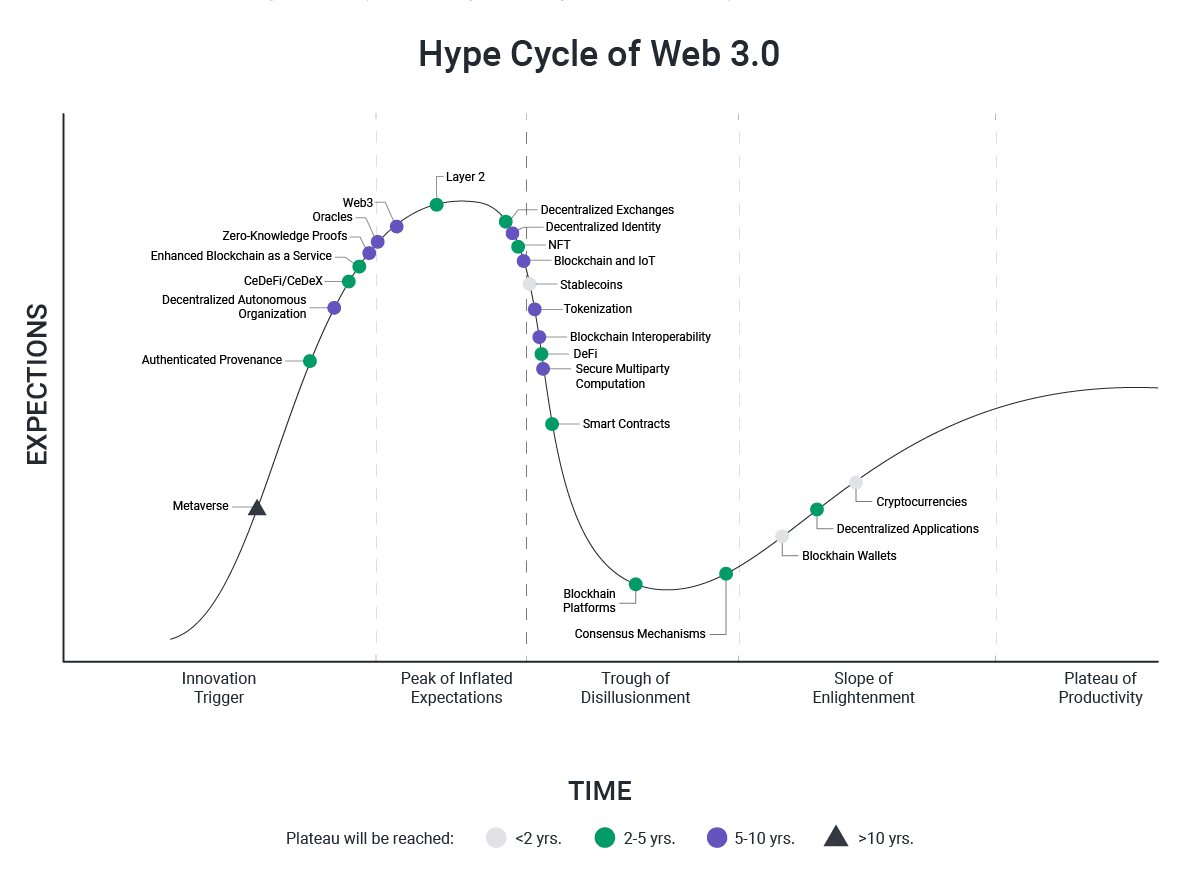Imagine this: You go to a concert and you are gifted an NFT from the event venue through a Web 3.0 provider…
The NFT you received is good for a single replay of the performance in a “digital twin” of the event venue – perhaps in the Metaverse – and there are only 1,500 tokens available, which are only available to those who attended the concert.
You can either choose to use the NFT to rewatch a part of the concert, gift it to someone unable to attend, or resell it in the Metaverse and earn some money. You are allowed to profit because an NFT is an asset, not a license, and it has specific remuneration rules around it (i.e. “smart contracts”).
Let’s look at this from the event venue’s perspective: No matter how the concert attendee decides to use the gifted NFT, the transaction will require that the NFT recipient’s valid contact information is inputted into your venue’s database.
Now, not only are fans engaged in a novel way, but the event venue has a brand new avenue to grow its in-person audience. The valuable information gathered through NFT transactions allows venues to digitally advertise future events to already-interested people in the Metaverse.
Sounds cool! But will Web 3.0 look like this? This article will cover the basics of Web 3.0, where Web 3 has appeared so far in the ticketing industry, and whether Web 3 is a technology to adopt ASAP or if it’s just a digital trend that’s been hyped up.
The Basics of Web 3.0

How Did We Get to Web 3.0?
Web 1.0 refers to the early internet of the ’90s, while Web 2.0 is considered to be the current state of the internet.Web2 has been dominated by streaming services and the rise of social media and is primarily controlled by a relatively small number of companies. However, the ideators behind Web 3.0 believe this internet shift will disrupt the current media oligopoly.
Web 3.0 is an idea for a version of the internet that is decentralized and based on interconnected networks, like public blockchains. This will allow people to transfer data, money, and value to each other directly.
NFTs, or non-fungible tokens, are considered to be one of Web3’s most prominent assets. This doesn’t come as a surprise, since the NFT market has already significantly impacted many industries in a short time, from Ticketing to Fintechs.
Decentralized Applications (dApps)
Would it be possible to have a massively-utilized application or social media platform where no company earns money, but instead all users profit?
Well, this idea isn’t so different from Open Source software platforms, such as Jenkins and Kubernetes, where work is delegated to a community of volunteer contributors. Open source contributors are unpaid, but users benefit either from using the software they help create or by selling services relating to it.
Ownerless apps, also called Decentralized Applications (dApps), have concepts similar to Open Source platforms and are software that runs on the blockchain. dApps are created to run without people or a business and instead rely on systems of simple rules and instructions.
Unlike Open Source platforms, the work needed to develop and operate dApps is paid for through the automatic creation and appreciation of a cryptocurrency specific to each dApp (i.e. a “utility token”).
Imagine Facebook as a dApp in the Web 3.0 world; Meta would not have ownership of it. Instead of a centralized business earning money from the application, the profits would be re-distributed to the users of the platform. In a way, this makes sense, since, without user content, Facebook wouldn’t have much value.
If social media dApps were to take off, users creating content would receive their fair share of the value they’re creating on these platforms, instead of the majority of profits going to a corporation.
How Does Web 3.0 Apply to the Ticketing Industry?
As mentioned previously, one of the fastest-emerging sectors of Web 3.0 is non-fungible tokens (NFTs). NFT and blockchain technology has been idealized by many industries - including ticketing.
Many proponents of blockchain use in the ticketing industry have argued that this new technology can solve many problems, from preventing fraud, creating revenue opportunities for performers and venues, and giving organizers more control over the ticket reselling process.
In past articles, Softjourn’s ticketing experts have asserted that fighting counterfeit tickets, scams, and fraud is possible without blockchain technology. We’ve found that digital ticketing solutions in most situations are significantly more effective and affordable than using blockchain or NFTs for ticketing, so we normally don’t recommend blockchain and NFT for combatting ticket fraud.
However, there are some areas where blockchain and NFTs solutions truly shine in the ticketing industry, especially for artists and venues.

First, when it comes to the age-old issue of ticket reselling, NFTs can be a great way for patrons to record the ownership of their tickets on the blockchain and for the venue to have better control and show transparency to fans. Ticket owners can easily trade or gift NFT tickets; when it is show-time, every party feels confident that each ticket has only one owner.
For unique festivals, exhibitions, and events, creating tradeable merchandise as NFTs often means higher value and increased interest. Coachella festival decided to offer its fans lifetime passes with their new Coachella Collectible NFTs. Each NFT token also delivers pre-programmed perks to attendees, from posters and other mementos linked to artists performing at the festival, to passes that allowed entry to exclusive on-site events.
Recently, MoonPay, a Brazilian-based platform that enables the sale and purchase of cryptocurrencies, became a major sponsor of Flamengo’s basketball team. As part of their new deal, MoonPay will help Flamengo leverage NFTs and Web3 to boost fan engagement.
Another benefit of using blockchain is that organizers can better control ticket prices and create a royalty payment system so artists won’t lose out on much money due to scalpers. With NFTs, every transaction is fully disclosed on the blockchain and this cannot be falsified or manipulated, which allows artists or organizers to see the full lifecycle of ticket sales.
Along with this, artists can determine if their tickets can be resold on the blockchain. If they decide to make them available on the secondary market, they can select a set resale price and ensure they get a fair cut.
What to Consider Before Adopting Web 3.0?

NFTs seem to have already peaked in popularity, but Web 3.0 and the Metaverse are still in their nascency. While Meta and other social media giants are eager to jump into this new frontier, the public at large is not yet ready to adopt Web 3.0.
For early adopters in the ticketing industry wondering whether Web 3.0 is worth pursuing, it is best to proceed with caution, as it is simply not ready for full-scale adoption yet on a consumer level.
Users simply haven’t been very eager to adopt this strange, hyped-up-by-billionaires idea, as they don’t yet see a tangible value in it. And unfortunately for Web 3.0 enthusiasts, dedicated users are the most crucial aspect of making Web 3.0 have any value at all.
The failure of Meta’s virtual world has been widely covered by the media this year. Even with the hype from Zuckerberg and the uniqueness of the idea, the Metaverse did not take off for multiple reasons, including sexual harassment to users, poor rendering, and general disinterest from users. All in all, the Metaverse just didn’t prove its value to users.
However, if you still are interested in implementing Web 3.0, we recommend that you prioritize how you can drive palpable value for virtual events and NFT tickets.
An example of a successful virtual event predating Web 3.0 was in 2019, when Marshmello, a famous DJ, performed a virtual concert for over 10 million people on the wildly popular multi-million-user video game, Fortnite. The reason this event drew fans and had value? Scarcity, uniqueness, and targeting the right audience in the right space.
At the end of 2022, multiple Web 3.0 and virtual events are scheduled to take place, including Metallica’s Helping Hands concert streamed on Paramount+, a Tiktok concert from the Electronic duo Bicep, and a celebrity meet-and-greet through GameStop’s NFT Marketplace.
Those who are interested in implementing and exploring Web 3.0 and the Metaverse can attend the Open Metaverse Conference, which will take place virtually and in Los Angeles in February 2023.
Driving Value of Web 3.0 in Ticketing

As for driving value for NFT tickets, creating significant long-term value requires carefully-crafted fan engagement ecosystems that connect physical and digital events. Implementing a strategy that brings fans from an in-person event to a “digital world” or platform is essential. Additionally, providing unique and rare digital add-ons may help increase revenue and promote consumer buy-in.
When deciding to implement new ticketing technology, such as Web 3.0, consider deeply what your fans are looking for: transparency, accountability, and a fun, safe, and meaningful event. When you prioritize the experience of your fans - from the ticket-buying process to fan engagement - you will build patron loyalty, which is essential for a successful event, whether it’s done in the real world or with Web 3.0.
Before choosing to use Web 3.0 for events or ticketing, discover and consider alternative options, as there might be better solutions beyond blockchain and NFTs technology. Not sure what is the right tech solution for you? Don’t hesitate to reach out and request a free consultation from our ticketing experts.











